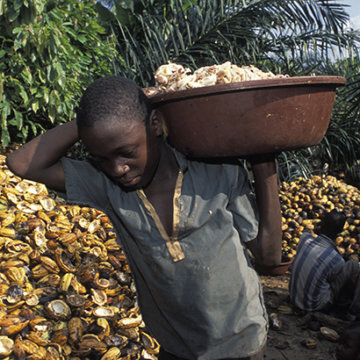- About
- Topics
- Picks
- Audio
- Story
- In-Depth
- Opinion
- News
- Donate
- Signup for our newsletterOur Editors' Best Picks.Send
Read, Debate: Engage.
| located: | Ivory Coast (Côte d'Ivoire), Ghana |
|---|---|
| editor: | Bob Koigi |
The decision by Ghana and Ivory Coast to set a minimum price for cocoa beans in order to insulate poor families who produce for global chocolate companies is a great step in addressing the minor labour quandary, where an estimated 1.6 million children, some of which are trafficked, work in cocoa production in the two countries.
The two West African nations cumulatively supply an estimated 65 percent of all global cocoa.
And while the development doesn’t in itself fully address the problem, it has set in place a mechanism where the cocoa farmers can, in the future, negotiate for higher prices while ensuring that they are able to hire adult workers. Traditionally, farmers have relied on child labour due to its affordability, a move that has seen millions of children drop out of school as they seek to supplement their families’ income.
Researchers have posited that increasing cocoa prices are vital in ending child labour. A U.S. study for example indicated that Ghana can keep its children from working in cocoa farms if it increases its payments to farmers by 50 percent, but further notes that while this might not be possible, a three percent increase was enough to spare minors from dangerous work – like operating machetes or working for over 42 hours a week since such illegal activities are occasioned by poverty, with the justice system rarely pursuing such cases. It is encouraging to note that global brands like Mars and Hershey have committed to only buying ethical cocoa by 2020, which will go a long way in tackling minor labour.
The move in the West African cocoa trade should inspire similar, if not more aggressive approaches to addressing child labour in sectors from mining, agriculture and manufacturing – especially in the world’s poorest countries where up to 218 million children work, denying them education, putting them at risk and robbing them the right to be children.
